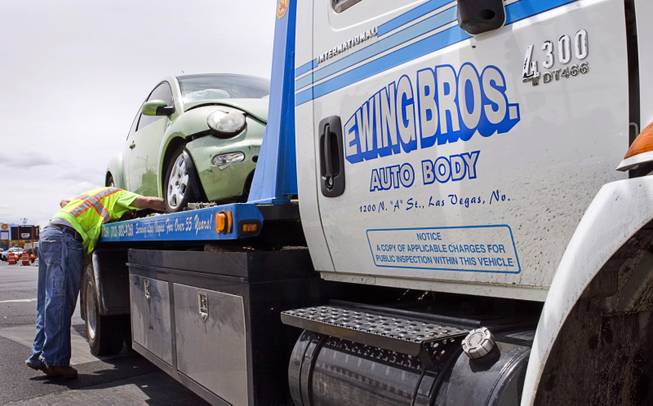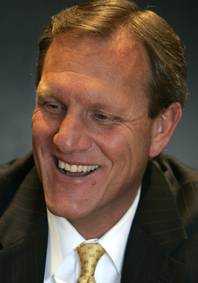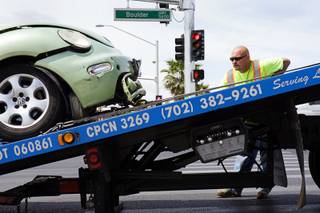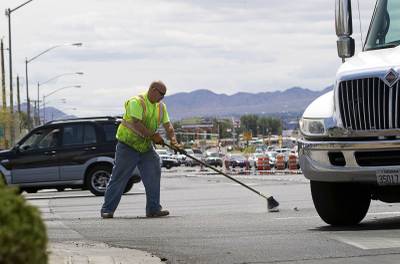
A Ewing Bros. tow operator secures a car on his truck after an accident at Boulder Highway and Tropicana Avenue, May 17, 2011.
Thursday, May 19, 2011 | 2:44 a.m.

Richard Perkins
Sun coverage
As Henderson tow company owner Bobby Ellis tells it, Las Vegas motorists are in the grip of a powerful monopoly aided by cronyism.
Crash your car on the streets of Las Vegas and you or your insurance company will have no choice but to pay a slate of fees to one of only two tow companies the police will summon to clear the street — cleanup fees, window taping fees, winching fees.
And just wait until your car gets to the storage lot, where a whole host of new fees will be tacked on for you or your insurance company.
Ellis says he wants to break that monopoly.
But first he needs the help of state lawmakers — to whom he’s contributed heavily over the years — to help him create his own de facto monopoly.
Ellis, with the help of his lobbyist, former Assembly Speaker Richard Perkins, has written legislation that would allow insurance companies to designate their own storage yards — potentially yanking away a significant source of revenue from the two tow companies doing business for the Metro Police.
If Ellis’ bill, Senate Bill 407, is successful, he is best positioned to grab that business. He owns a storage yard that largely complies with requirements in the bill he’s written and has built strategic relationships with insurance companies, largely by helping them protest the fees charged by Metro’s two go-to tow companies.
At stake in the little-noticed bill is a tremendous amount of money. Ewing Brothers and Quality Towing, Metro’s two contracted tow companies, could lose two-thirds of their income if they can no longer store and then salvage or auction the towed vehicles.
Ellis would have access to a rich inventory of cars — more than 33,000 cars were towed from crashes last year — that he could store and then auction, skipping the expense of maintaining a fleet of tow trucks and drivers to do the actual towing.
“There’s a really good chance that for whoever gets that business, it would be a ton of money,” said Andrew MacKay, chairman of the Nevada Transportation Authority, which regulates tow companies and has taken a neutral position on SB407.
As a result, the political juice lined up on both sides is considerable. It’s earned the designation as the session’s most lobbied bill.
The outcome will depend on which side emerges from the clash of some of the state’s most powerful lobbyists, who represent the varying sides of the fight.
And for all the lobbying money spent on arguing both sides of the bill, it is unlikely any victim of a car crash would actually see their tow fees drop as a result of the law passing.
The genesis of this bill came almost two years ago, when the insurance industry approached Ellis to help audit hundreds of questionable tow bills. Ellis operates Snap Towing, which has a contract in Henderson but has been unable to obtain a contract with Metro.
Farmers Insurance, according to its lobbyist Bob Compan, noticed that Quality Towing’s charges were 40 percent higher than Ewing Brothers, which prompted the audit.
That audit resulted in the insurance industry filing hundreds of complaints with the NTA, which dismissed most of the complaints and ultimately fined Quality Towing $4,300 for failing to adequately substantiate its fees in some instances, MacKay said.
Amid the audit, Ellis came up with the idea of giving insurance companies an alternative to the storage yards of Metro’s two tow companies.
If insurance companies could designate their own storage yards, and the tow companies could be compelled to take the vehicles to those yards, perhaps it would spur competition to drive down storage rates, Ellis argued.
For more than 30 years, Metro has used only Ewing Brothers and Quality Towing. The companies are on a monthly rotation.
Ellis argues Metro’s requirements are so stringent that no other companies can compete.
Responding to the criticism, Metro recently implemented a system for requesting qualifications from tow companies. As a result, a third company may soon be added to the roster.
Metro lobbyist Chuck Callaway said the requirements are stringent because the city needs to quickly clear streets and intersections when a crash occurs. To respond quickly to a crash site, the tow company must have enough drivers and enough equipment.
Ellis and his insurance company allies argue the requirements have led to price gouging.
“We have no choice but to pay whatever they say we have to,” said Michael Geeser, lobbyist for AAA Nevada. “And those prices are all rubber-stamped by the Nevada Transportation Authority.”
Tow companies submit tariffs to the NTA, which reviews the rates for price-gouging and fairness, MacKay said.
Ellis argues that would change if insurance companies could pick their own lots. And he said there’s no guarantee he would get any contracts.
“Nothing guarantees he gets a contract,” Perkins said. “He may not ever get a dime out of this.”
In a tacit admission that their fees and billing practices have antagonized insurance companies to the point of breaking business relationships, a lobbyist for Quality Towing said Metro’s two tow companies would have a slim chance of winning such a contract were the situation to change.
“Have there been abuses? You bet there have been,” Mike Sullivan, a veteran Democratic lobbyist, said. “We’ve been working on this for two years now.
“You think they’re going to give us their business?”
So where does the political juice come in?
Perkins, Ellis’ lobbyist, lost a key battle in the Senate, which gutted Ellis’ bill before sending it to the Assembly.
Lobbyists opposing the bill are no less high-powered than Perkins. They include Sam McMullen, the Las Vegas Chamber of Commerce’s longtime lobbyist; Pete Ernaut of R&R Partners; and Sullivan.
That team persuaded the Senate to replace Ellis’ proposal with language requiring the NTA to investigate billing practices and create a standard fee tariff that all companies would adhere to — a process the authority has undertaken.
But Perkins, who maintains strong ties in the Assembly he used to lead, is working to amend the bill to once again give insurance companies the power to designate their own tow lots.
And Ellis is working the relationships he’s built through generous giving to political campaigns over the years.
When the bill appeared stalled in the Commerce and Labor Committee, Ellis called Speaker John Oceguera, D-Las Vegas, for advice. In an email obtained by the Las Vegas Sun, Ellis wrote that Oceguera supported the cost-savings aspect of the legislation but wondered why more insurance companies didn’t testify in support of it.
Oceguera “believes written support from the insurance companies could help persuade committee members that (sic) have not yet made a commitment,” Ellis wrote in the email.
“That was stretching our conversation,” Oceguera said, adding he simply questioned why only one insurance company testified in favor of the bill if the industry supported it.
Oceguera said he is still deliberating whether to support the bill.
“If it saves the consumer money, I’m for that,” he said. “But I’m not in favor giving someone a monopoly.”
Opponents of the bill have argued Ellis’ political contributions have given him undue influence.
But Assemblyman Kelvin Atkinson, D-North Las Vegas, chairman of the committee that will decide whether the bill lives or dies, scoffed at that notion, particularly because the other players have been just as generous with campaign contributions.
“Sure he’s given me money, but so has the other side,” Atkinson said of Ellis. “And they’ve probably given me more money. It’s asinine and it’s reckless to say I’m for or against a piece of legislation because of campaign contributions.”
But what of the public policy at stake here?
MacKay, whose mission is to look out for the consumer, said it’s difficult to predict whether Ellis’ proposal would result in any consumer savings.
The bill targets only one kind of tow — nonconsent tows for vehicles involved in crashes.
In most cases, insurance companies pick up all the costs. If they save money, maybe they would pass it along to the consumer.
Motorists with only liability insurance, or those involved in a crash with an uninsured motorist, could be subject to those tow charges.
But it’s unknown whether any competition would result or if any prices would be driven down if Ellis gets his way, MacKay said.
“Perhaps the storage rates could drop, but then the operators would have no choice but to potentially raise their rates for tows, or for private party tows,” MacKay said. “If they took such a revenue hit, it would drive the revenue somewhere else so they can keep the doors open. These are not high-margin businesses. They’re barely getting by the skin of their teeth.”
As tow company lobbyist Mike Draper put it: “Only time will tell if the most lobbied bill of the session will actually do anything. Only time with tell.”



Join the Discussion:
Check this out for a full explanation of our conversion to the LiveFyre commenting system and instructions on how to sign up for an account.
Full comments policy